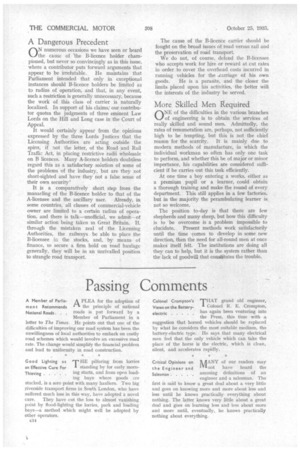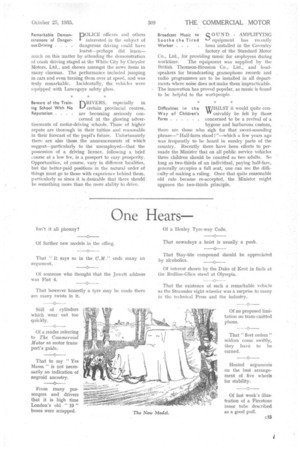Passing Comments
Page 56

Page 57

If you've noticed an error in this article please click here to report it so we can fix it.
A Member of ParliaA PLEA for the adoption of
ment Recommends the principle of national National Roads. . . roads is put forward by a Member of Parliament in a letter to The Times. He points out that one of the difficulties of improving our road system has been the unwillingness of local authorities to embark on costly road schemes which would involve an excessive road rate. The change would simplify the financial problem and lead to uniformity in road construction.
Good Lighting as "pilfering from lorries
an Effective Cure For standing by for early morn Thieving ing starts, and from open load ing bayswhere goods :Ire stacked, is a sore point with many hauliers. Two big riverside transport firms in South London, who have suffered much loss in this way, have adopted a novel cure. They have cut the loss to almost vanishing point by flood-lighting the lorries, park and loading bays—a method which might well be adopted by other operators.
c:14
THAT grand old engineer, I Colonel R. E. Crompton, has again been venturing into the Press, this time with a suggestion that horsed vehicles should be replaced by what he considers the most suitable medium, the battery-electric type. He says that many electrical men feel that the only vehicle which can take the place of the horse is the electric, which is clean, silent, and accelerates rapidly.
Colonel Crompton's Views on the Battery electric
Critical Opinions on of our readers may the Engineer and I'not have heard the Salesman amusing definitions of an engineer and a salesman. The first is said to know a great deal about a very little and goes on knowing more and more about less and less until he knows practically everything about nothing. The latter knows very little about a great deal and goes on learning less and less about more and more until, eventually, he knows practically nothing about everything.
Remarkable DemonDOLICE ofhcers and others strations of DangerI interested, in the subject of ous Driving . . . dangerous driving could have
learnt—perhaps did learn— much on this matter by attending the demonstration of crash driving staged at the White City by Chrysler Motors, Ltd., and -shown amongst the news items in many cinemas. The performance included jumping in cars and even turning them over at speed, and was truly remarkable. Incidentally, the vehicles were equipped with Lancegaye safety glass.
Beware of the TrainnRIVERS, especially in ing School With No L.' certain provincial centres, Reputation . . . . are becoming seriously con,
cerned at the glowing advertisements of motor-driving schools. Those of higher repute are thorough in their tuition and reasonable in their forecast of the pupil's future. Unfortunately there are also those the announcements of which suggest—particularly to the unemployed—that the possession of a driving licence, following a brief course at a low fee, is a passport to easy prosperity. Opportunities, of course, vary in different localities, but the better-paid positions in the natural order of things must go to those with experience behind them, particularly so since it is desirable that there should be something more than the mere ability to drive. SOUND AMPLIFYING equipment has recently been installed in the Coventry factory of the Standard Motor Co., Ltd., for providing music for employees during worktime. The equipment was supplied by the British Thomson-Houston Co., Ltd., and loudspeakers for broadcasting gramophone records and radio programmes are to be installed in all departments where noise does not make them impracticable. The innovation has proved popular, as music is found to be helpful to the workpeople.
Broadcast Music to Soothe the Tired
Worker . . .
Difficulties in the WHILST it would quite con
Way of Children's " ceivably be felt by those
Fares concerned to be a revival of a bygone and barbarous custom, there are those who sigh for that sweet-sounding phrase—" Half-fares stand! "—which a few years ago was frequently to be heard in sundry parts of the country. Recently there have been efforts to persuade the Minister that on all public service vehicles three children should be counted as two adults. So tong as two-thirds of an individual, paying half-fare, generally occupies a full seat, one can see the difficulty of making a ruling. Once that quite reasonable old rule became re-accepted, the Minister might approve the two-thirds principle.
















































































































































